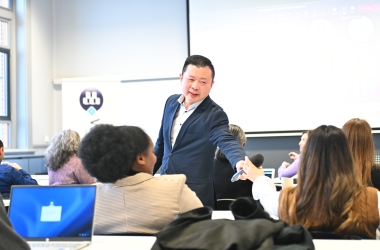Wittenborg Online News!
Wittenborg’s Globalisation Conference: Exploring Education in a Globalised Era
Wittenborg’s Globalisation Conference: Exploring Education in a Globalised Era
Wittenborg’s Globalisation Conference: Exploring Education in a Globalised Era

Dadi Chen Explores Recent Changes and Opportunities in Education
As we find ourselves in an era of globalisation, 'Education in a Globalised Era' has been chosen as Theme 10 of Wittenborg’s Globalisation Conference, set to take place from 14 to 16 August in Apeldoorn.
Dadi Chen, Deputy Head of the School of Business, who is also a reviewer during the conference, sheds light on 'Education in a Globalised Era' and 'preparing the next generation for a boundary-less world', noting that this phenomenon is already occurring in many countries. Despite acknowledging that education lags behind other industries, Chen notes significant shifts, particularly seen in the increasing number of students opting to study abroad.
"When people choose to study at an international business school or university, they become more independent, making it easier to adapt to diverse learning and work environments," Chen explains. "International education positively influences individuals, especially in the era of technology like Artificial Intelligence (AI) and other technological advancements."
One pressing question posed by Chen revolves around the evolving role of universities in today's information-rich world. Traditionally perceived as "bastions of knowledge", universities now face challenges posed by platforms like ChatGPT, for instance. Chen prompts us to consider how educational institutions adapt, whether by integrating such platforms or becoming part of them.
According to him, the focus lies on training students to be future professionals who are proficient in using technology yet remain independent thinkers. To navigate these changes, it is also important to update the education system to cater for students from diverse backgrounds and industries. This involves continuous improvement of teaching methods, administrative processes and overall educational infrastructure.
Diving into sub-themes: Curriculum Internationalisation
Researchers exploring the theme 'Education in a Globalised Era' might delve into sub-themes such as leveraging technology for global business education, cultivating cross-cultural leadership, analysing the benefits and challenges of international experience, nurturing innovation in the global business landscape, building collaborative initiatives with global institutions, and instilling universal standards and values in business practices.
To offer more insight into one of the sub-themes called 'Curriculum Internationalisation', Chen says that international business schools and universities should be cautious of assuming their curriculum's automatic internationalisation just because they have international staff and students who often still use textbooks published in the United States and used in Europe, for instance.
"The trend of global communication means everything is mingled. So, if you want to convince people of the quality of your country's learning materials, you must consider their perspective. How do they perceive the value you're offering, considering potential conflicts? If people say, well, the principles that you invented do not apply here in this country, you need to consider that."
He appreciates the term 'boundary-less' because it reflects how modules can now be accessed online from various countries, allowing individuals to gain a global perspective on the knowledge they acquire through education.
Changes in the educational landscape do not stop there though. He says that many of Wittenborg's MBA (Master of Business Administration) students, for example, have work experience in different countries, making them knowledge contributors. "I've noticed that lecturers are more modest than before. Lecturers have started asking students, 'What have you done?' and 'What is your experience?' and 'What would you do if you were in that situation?' It is important to ask the students to be a part of the learning process in this case."
This can also lead to a potential shift away from traditional textbooks, envisioning a classroom environment where real-world examples are sourced globally and openly shared among students. "Lecturers now learn from students," he remarks. "We're in the same classroom, talking about the same thing, wanting to develop together. It's a positive change spurred by internationalisation."
Chen invites researchers to submit papers on these themes for the conference. Ultimately, he underscores the significance of the Globalisation Conference as a platform for researchers to communicate, share and discuss their findings across various topics.
WUP 12/04/2024
by Erene Roux
©WUAS Press
684 words